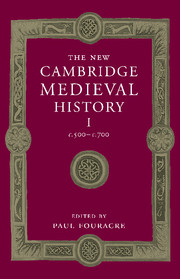Book contents
- Frontmatter
- Introduction: the history of Europe 500–700
- 1 The later Roman Empire
- 2 The Barbarian invasions
- 3 The sources and their interpretation
- PART I THE SIXTH CENTURY
- PART II THE SEVENTH CENTURY
- PART III THEMES AND PROBLEMS
- List of Primary sources
- Bibliography of secondary works arranged by chapter
- Index
- Frontispiece"
- Plate section"
- Map 3 Gaul/Francia in the sixth and seventh centuries"
- References
1 - The later Roman Empire
Published online by Cambridge University Press: 28 March 2008
- Frontmatter
- Introduction: the history of Europe 500–700
- 1 The later Roman Empire
- 2 The Barbarian invasions
- 3 The sources and their interpretation
- PART I THE SIXTH CENTURY
- PART II THE SEVENTH CENTURY
- PART III THEMES AND PROBLEMS
- List of Primary sources
- Bibliography of secondary works arranged by chapter
- Index
- Frontispiece"
- Plate section"
- Map 3 Gaul/Francia in the sixth and seventh centuries"
- References
Summary
political and military decline
Where the Romans came, saw and conquered, they usually stayed a very long time. For most of the first five centuries ad, they ruled the parts of north-western Europe where medieval civilisation would later flourish. This nation of stocky, rather shortish, dark-haired people, although foreigners from the central Mediterranean, none the less profoundly affected north-western Europe’s way of life in ways which would linger long after their political system had crumbled into misty and misshapen memories. The Romans gained the time to affect northern Europe more profoundly than any conquerors before or since for two reasons, both, perhaps not surprisingly, military ones.
First, the Romans very early in their history developed their legion and its marvellous system of logistical support. They did this in large part during their wars with the Samnites, at the turn of the fourth to the third century bc. The legion demanded much from its foot soldiers, but it was a fearsome instrument capable of sophisticated tactical versatility. In short, the Romans could usually quite easily conquer any non-civilised people they opposed, and they prevailed over their civilised enemies as well, although with more difficulty. The legion’s systems of support also meant it could fight effectively far from home. Under their great general, Julius Caesar, the Romans conquered most of north-western Europe. Caesar did so in a brutally quick seven years.
Keywords
- Type
- Chapter
- Information
- The New Cambridge Medieval History , pp. 13 - 34Publisher: Cambridge University PressPrint publication year: 2005

